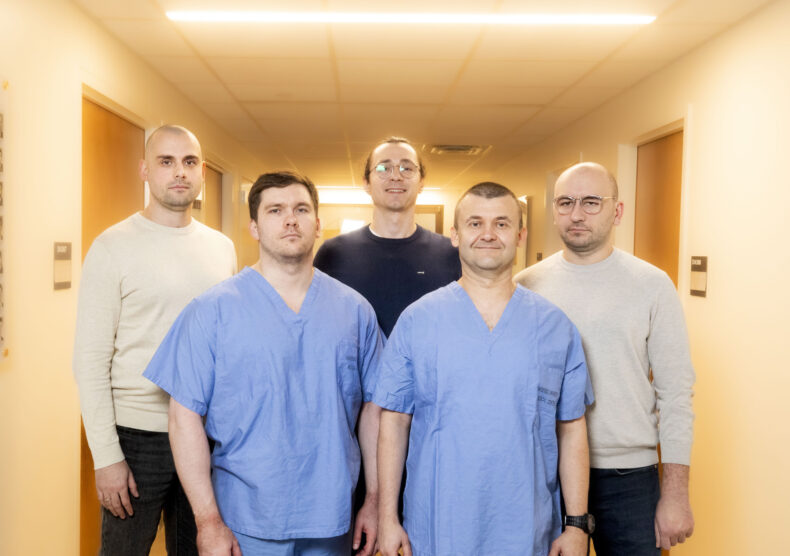by Matt Batcheldor
A group of doctors from Ukraine recently visited Vanderbilt University Medical Center to observe transplants and protocols as part of an initiative to establish a lung transplant program and improve heart transplantation in the war-torn country.

Only a single case of lung transplantation has occurred in Ukraine, said Vitalii Sokolov, MD, a thoracic surgeon who was part of a group of 13 Ukrainian physicians visiting the United States. Historically, Ukraine’s transplant programs have been underdeveloped, as citizens would typically leave the country for hubs such as India and Belarus to receive transplants.
The Ukrainian government, which funds transplants for its citizens, determined in recent years that it would be more cost effective to develop a more robust transplant program in-country, Sokolov said. The need for a transplant program became even more critical after travel became difficult, first due to the COVID-19 pandemic in 2020 and then the Russian invasion of Ukraine in February.
In just the last several years, the country has gone from 10 to 20 transplants per year to more than 200, said Rostyslav Semikov, co-founder and director of Peace and Development Foundation, which helped arrange the visit to the United States with the Ukrainian government. But very few of those are heart or lung transplants, because the procedures are more complex and require a larger, multispecialty team.
That’s where the observation of Vanderbilt procedures comes in — not just witnessing the transplant surgeries themselves but understanding the protocols that surround them. That includes how to determine who is a good candidate for a transplant, how to keep patients alive during transplants using extracorporeal life support, and how to manage patients post-transplant with frequent laboratory tests and a balance of multiple medications.
“We appreciate Vanderbilt,” Semikov said. “It’s an outstanding medical center. And especially we are touched by people’s openness and being willing to go the extra mile in explaining and sharing and showing. It has been a great experience.”
One day after they arrived, the doctors had the opportunity to observe a lung transplant and the patient in rounds afterward.
“We discussed with immunologists, with surgeons, with intensivists, with nurse practitioners, of the details that we were interested in,” Sokolov said. “It was very pleasant to have detailed answers on all the questions we proposed.”
The doctors first spent three months observing the cardiothoracic transplant program at Massachusetts General Hospital in Boston before traveling to Vanderbilt for a five-day visit during the first week of December.
The visit was arranged through the Peace and Development Foundation team and former U.S. Sen. Bill Frist, MD, founding director of the Vanderbilt Transplant Center. Frist’s organization, Hope Through Healing Hands, helped fund the visit.
“We were able to start and create a world-leading Transplant Center at Vanderbilt over three decades ago because we learned from other centers of excellence,” Frist said. “This week, Vanderbilt shared with our Ukrainian counterparts the cutting-edge medicine of our nation, so they can stand up their own best-in-class program thousands of miles away in the midst of unfathomable circumstances.”
These same doctors have been performing surgeries in dark hospitals in Ukraine as power grids have been shattered by war. They have been balancing the surge of wounded soldiers and civilians with typical patients.
Sokolov said he hopes the team will start their lung transplant program shortly after returning to Ukraine this month. “We are much more confident,” he said.
Vanderbilt will continue to be available for support, said Seth Karp, MD, H. William Scott Jr. Professor, chair of the Section of Surgical Sciences and director of the Vanderbilt Transplant Center.
“The Ukrainian team inspired us with their remarkable resilience and dedication to serving their patients,” he said. “We hope we can be a resource for them as they build their programs.”











